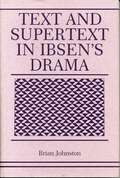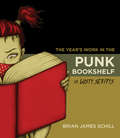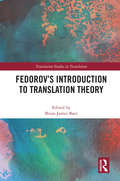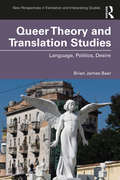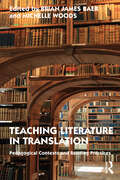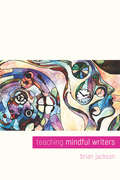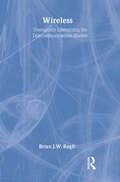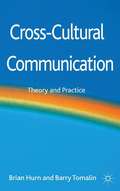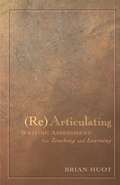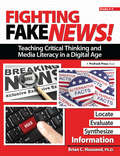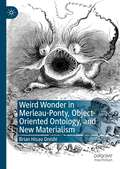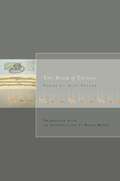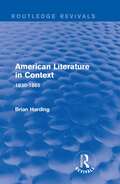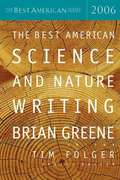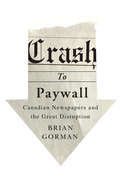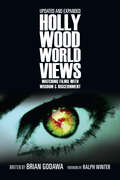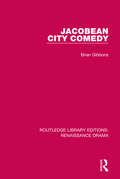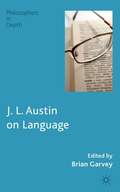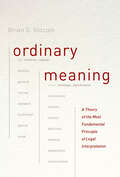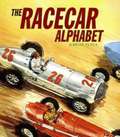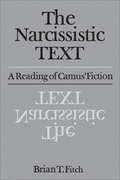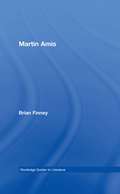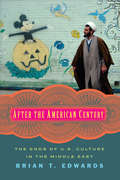- Table View
- List View
Text and Supertext in Ibsen’s Drama (G - Reference, Information and Interdisciplinary Subjects)
by Brian JohnstonBrian Johnston's approach to Ibsen, now well known, is unlike any other. Johnston sees Ibsen's twelve realist plays as a single cyclical work, the "realist" method of which hides a much larger poetic intention than has previously been suspected. He believes that the cycle constitutes one of the major works of the European imagination, comparable in scale to Goethe or Dante. And he has shown Ibsen to be the heir to Romantic and Hegelian art and thought, adapting this heritage to the circumstances of his own day.This work demonstrates how the language and scene, characters and "props," of the Ibsen dramas establish a bold and far-reaching theatrical goal: nothing less than an account of our biological and cultural identity in its multilayered totality. Johnston argues that Ibsen's realist text, while stimulating the appearance of nineteenth-century life, also objectively and precisely builds up an alternative image in which archetypal figures and situations from our cultural past repossess the realist stage. Thus he sees the Ibsen "strategy" in his realist plays as twofold: (1) the dialectical subversion of the nineteenth-century reality presented in the plays, and (2) the forced recovery of the archetypal from the past, in a procedure similar to James Joyce's in Ulysses. By "supertext" Johnston means a reservoir of cultural reference upon which Ibsen continuously drew in his realist work just as in is earlier poetic and historical dramas.
The Year’s Work in the Punk Bookshelf, Or, Lusty Scripts
by Brian James SchillThis is the story of the books punks read and why they read them. The Year’s Work in the Punk Bookshelf challenges the stereotype that punk rock is a bastion of violent, drug-addicted, uneducated drop outs. Brian James Schill explores how, for decades, punk and postpunk subculture has absorbed, debated, and reintroduced into popular culture, philosophy, classic literature, poetry, and avant-garde theatre. Connecting punk to not only Hegel, Nietzsche, and Freud, but Dostoevsky, Rimbaud, Henry Miller, Kafka, and Philip K. Dick, this work documents and interprets the subculture’s literary history. In detailing the punk bookshelf, Schill contends that punk’s literary and intellectual interests can be traced to the sense of shame (whether physical, socioeconomic, cultural, or sexual) its advocates feel in the face of a shameless market economy that not only preoccupied many of punks’ favorite writers but generated the entire punk polemic.
Fedorov's Introduction to Translation Theory (Translation Studies in Translation)
by Brian James BaerThis is the first English translation of Andrei V. Fedorov’s classic 1953 text Vvedenie v teoriiu perevoda / Introduction to Translation Theory. Fedorov was the first to argue that translation theorizing should be based on linguistics, due to the fact that language is the common denominator of all translation. In addition, this text offers a concise but thorough comparative overview of thinking on translation in Western Europe and Russia. The detailed annotations and substantial introduction by the leading scholar and award-winning translator Brian James Baer inscribe Fedorov’s work in the political and cultural context of the Soviet Union, highlighting the early influence of Russian Formalism on Fedorov’s thinking. This volume is a model of scholarly translation that fills a major gap in our understanding of Soviet translation theory, which will compel a rethinking of current histories of the field. Contributing to the important work of internationalizing and generating new histories of translation studies, this volume is key reading for scholars and researchers of the history, theory, and politics of translation studies; comparative literature; and Russian and Slavic studies.
Queer Theory and Translation Studies: Language, Politics, Desire (New Perspectives in Translation and Interpreting Studies)
by Brian James BaerThis groundbreaking book explores the relevance of queer theory to Translation Studies and of translation to Global Sexuality Studies. Beginning with a comprehensive overview of the origins and evolution of queer theory, this book places queer theory and Translation Studies in a productive and mutually interrogating relationship. After framing the discussion of actual and potential interfaces between queer sexuality and queer textuality, the chapters trace the transnational circulation of queer texts, focusing on the place of translation in "gay" anthologies, the packaging of queer life writing for global audiences, and the translation of lyric poetry as a distinct site of queer performativity. Baer analyzes fictional translators in literature and film, the treatment of translation in historical and ethnographic studies of sexual and linguistic others, the work of queer translators, and the reception of queer texts in translation. Including a range of case studies to exemplify key ethical issues relevant to all scholars of global sexuality and postcolonial studies, this book is essential reading for advanced students, scholars, and researchers in Translation Studies, gender and sexuality studies, and related areas.
Teaching Literature in Translation: Pedagogical Contexts and Reading Practices
by Brian James BaerThe teaching of texts in translation has become an increasingly common practice, but so too has the teaching of texts from languages and cultures with which the instructor may have little or no familiarity. The authors in this volume present a variety of pedagogical approaches to promote translation literacy and to address the distinct phenomenology of translated texts. The approaches set forward in this volume address the nature of the translator’s task and how texts travel across linguistic and cultural boundaries in translation, including how they are packaged for new audiences, with the aim of fostering critical reading practices that focus on translations as translations. The organizing principle of the book is the specific pedagogical contexts in which translated texts are being used, such as courses on a single work, survey courses on a single national literature or a single author, and courses on world literature. Examples are provided from the widest possible variety of world languages and literary traditions, as well as modes of writing (prose, poetry, drama, film, and religious and historical texts) with the aim that many of the pedagogical approaches and strategies can be easily adapted for use with other works and traditions. An introductory section by the editors, Brian James Baer and Michelle Woods, sets the theoretical stage for the volume. Written and edited by authorities in the field of literature and translation, this book is an essential manual for all instructors and lecturers in world and comparative literature and literary translation.
Teaching Mindful Writers
by Brian JacksonTeaching Mindful Writers introduces new writing teachers to a learning cycle that will help students become self-directed writers through planning, practicing, revising, and reflecting. Focusing on the art and science of instructing self-directed writers through major writing tasks, Brian Jackson helps teachers prepare students to engage purposefully in any writing task by developing the habits of mind and cognitive strategies of the mindful writer. Relying on the most recent research in writing studies and learning theory, Jackson gives new teachers practical advice about setting up writing tasks, using daily writing, leading class discussions, providing feedback, joining teaching communities, and other essential tools that should be in every writing teacher’s toolbox. Teaching Mindful Writers is a timely, fresh perspective on teaching students to be self-directed writers.
Wireless: Strategically Liberalizing the Telecommunications Market (Lea Telecommunications Ser.)
by Brian J.W. RegliThe revolution of wireless communications has only just begun to transform the telecommunications industry worldwide. This book offers insight into the possible options for corporate strategists and government policymakers as they look to harness the expansion of wireless communications to meet the goals of sustainable telecommunications development. Using a multidisciplinary approach which combines policy research, legal analysis, business economics, and models of sustainability from the environmental sciences, the book compares the development of wireless communications in four countries: the United States, the United Kingdom, Russia, and Brazil. The comparative analysis points to common themes and opportunities, including: * breaking down the barriers between wireless and wireline access by changing the regulatory design which constrains service providers; * targeting the development potential of wireless access through the utilization of new technologies and service models; and * using wireless access as the basis for full facilities-based competition in both developing and developed world markets. No other book today offers this broad a context for a discussion of wireless communications and its potential impact on the evolution of the telecommunications industry.
Cross-Cultural Communication
by Barry Tomalin Brian J. HurnA comprehensive survey of the key areas of research in cross-cultural communication, based on the authors' experience in organizing and delivering courses for undergraduate and postgraduate students and in business training in the UK and overseas.
Rearticulating Writing Assessment for Teaching and Learning
by Brian HuotBrian Huot's aim for this book is both ambitious and provocative. He wants to reorient composition studies' view of writing assessment. To accomplish this, he not only has to inspire the field to perceive assessment--generally not the most appreciated area of study--as deeply significant to theory and pedagogy, he also has to counter some common misconceptions about the history of assessment in writing. In (Re)Articulating Writing Assessment, Huot advocates a new understanding, a more optimistic and productive one than we have seen in composition for a very long time. Assessment, as Huot points out, defines what is valued by a teacher or a society. What isn't valued isn't assessed; it tends to disappear from the curriculum. The dark side of this truth is what many teachers find troubling about large scale assessments, as standardized tests don't grant attention or merit to all they should. Instead, assessment has been used as an interested social mechanism for reinscribing current power relations and class systems.
Fighting Fake News! Teaching Critical Thinking and Media Literacy in a Digital Age: Grades 4-6
by Brian HousandEducators have long struggled to teach students to be critical consumers of the information that they encounter. This struggle is exacerbated by the amount of information available thanks to the Internet and mobile devices. Students must learn how to determine whether or not the information they are accessing is reputable. Fighting Fake News! focuses on applying critical thinking skills in digital environments while also helping students and teachers to avoid information overload. According to a 2017 Pew Research report, we are now living in a world where 67% of people report that they get their “news” from social media. With the lessons and activities in this book, students will be challenged to look at the media they encounter daily to learn to deepen and extend their media literacy and critical thinking skills. Now more than ever, teachers need the instruction in Fighting Fake News! to teach students how to locate, evaluate, synthesize, and communicate information.Grades 4-6
Weird Wonder in Merleau-Ponty, Object-Oriented Ontology, and New Materialism
by Brian Hisao OnishiThis book connects recent developments in speculative realism, new materialism, and eco-phenomenology to articulate an approach to wonder that escapes the connected traps of anthropocentrism and correlationism. Brian Onishi argues that wonder has explanatory power for the constitution of the world and the organization of meaning. To do this, he appeals to both fiction (speculative and Weird fiction in particular) and quantum physics. More specifically, he argues that the focus of Weird fiction on impossible experiences and a feeling of something just beyond the limits of one’s grasp dramatizes the speculative reach beyond the limits of our understanding. But more than a tool for knowledge acquisition, wonder is an organizing property of objects. Like the collapse of superposition in quantum physics, reality is constituted when objects reveal themselves to other objects and thereby organize themselves into complex objects. Since no relation is exhaustive, the capacity to wonder remains at a material level, and the possibility of reorganization is ever present. Ultimately, Onishi argues for a speculative eco-phenomenology with wonder as an engine for a Weird environmental ethics.
Dreamer of Dune: The Biography of Frank Herbert
by Brian HerbertA biography of Frank Herbert, author of 'Dune', by his son.
The Book of Things
by Brian Henry Ales StegerFrom his first book of poems, Chessboards of Hours (1995), Aleš Šteger has been one of Slovenia's most promising poets. The philosophical and lyrical sophistication of his poems, along with his work as a leading book editor and festival organizer, quickly spread Šteger's reputation beyond the borders of Slovenia. The Book of Things is Šteger's most widely praised book of poetry and his first American collection. The book consists of fifty poems that look at "things" (i.e. aspirin, chair, cork) which are transformed by Šteger's unique poetic alchemy.Translator Brian Henry is a distinguished poet, translator, editor, and critic.From Publisher's Weekly:Steger's efforts sometimes bring to mind such Western European figures as Francis Ponge and Craig Raine, who also sought to make household things look new and strange. Yet Steger brings a melancholy Central European sense of history- his objects tend to remember, or cause, great pain: "It pours, this poisonous, sweet force," Steger writes of "Saliva," "Between teeth, when you spit your own little genocide." (Nov.)From Guernica, a Magazine of Art and Politics:It is a rare treat to have an English translation before the ink has dried on the original. By which I mean, a mere five years after the book's Slovenian publication, Brian Henry has brought these poems to life for those of us not lucky enough to read Slovenian. Henry's translations are impressive for sheer acrobatics.
American Literature in Context: 1830-1865 (Routledge Revivals: American Literature in Context)
by Brian HardingFirst published between 1982 and 1983, this series examines the peculiarly American cultural context out of which the nation’s literature has developed. Covering the years from 1830 to 1865, this second volume of American Literature in Context examines twelve major American writers of the three decades before the Civil War, including Edgar Allan Poe, Ralph Waldo Emerson, Henry David Thoreau, Herman Melville and Walt Whitman. The book also analyses the writing of two contemporary historians, an intellectual Journalist and Abraham Lincoln. Among the major themes discussed the religious heritage of New England Transcendentalism, sectional rivalries, tensions between self-culture and social awareness, and the widening gulf between the idea of national destiny and the fact of growing disunity. In addition, the dominant literary forms of the period – sermon, essay, travelogue – are related to the common cultural assumptions of the age. This book will be of interest to those studying American literature and American studies.
The Best American Science and Nature Writing 2006
by Brian GreeneBestselling author Brian Greene edits this year's volume of the finest science and nature writing. Contributors include Walter Kirn, Ron Rosenbaum, Jeffrey Toobin, and Oliver Sacks as well as many others.
Crash to Paywall
by Brian GormanIn 2014, when Postmedia acquired Quebecor's Sun Media newspaper and online assets, there was a sense that the recent history of newspapers was repeating itself not as comedy or tragedy, but as eulogy. Crash to Paywall shows that while the newspaper business was weakened by decreases in advertising revenues and circulation, much of its problems stem from self-inflicted damage and business practices dating back to the 1970s. Brian Gorman explores the Canadian newspaper industry crisis and the relationship between the news media and the public. He challenges both the popular mantra that a "perfect storm" of unforeseen circumstances blindsided a declining industry and the narrative that readers were abandoning newspapers, causing advertisers to turn away from "dying" media. Gorman argues that observers had been warning for decades that the business was creating its own problems by acquiring ever-larger debt and shareholder obligations while steadily cutting back on journalists' resources. Finally, by providing journalism for free online, newspaper companies devalued their most important resource and impaired their profitable print products. With dozens of interviews conducted with leading Canadian journalists and editors, Crash to Paywall brings to light the many misconceptions, generalizations, omissions, and highly suspect conclusions about the present state of newspapers and their future.
Crash to Paywall: Canadian Newspapers and the Great Disruption
by Brian GormanIn 2014, when Postmedia acquired Quebecor's Sun Media newspaper and online assets, there was a sense that the recent history of newspapers was repeating itself not as comedy or tragedy, but as eulogy. Crash to Paywall shows that while the newspaper business was weakened by decreases in advertising revenues and circulation, much of its problems stem from self-inflicted damage and business practices dating back to the 1970s. Brian Gorman explores the Canadian newspaper industry crisis and the relationship between the news media and the public. He challenges both the popular mantra that a "perfect storm" of unforeseen circumstances blindsided a declining industry and the narrative that readers were abandoning newspapers, causing advertisers to turn away from "dying" media. Gorman argues that observers had been warning for decades that the business was creating its own problems by acquiring ever-larger debt and shareholder obligations while steadily cutting back on journalists' resources. Finally, by providing journalism for free online, newspaper companies devalued their most important resource and impaired their profitable print products. With dozens of interviews conducted with leading Canadian journalists and editors, Crash to Paywall brings to light the many misconceptions, generalizations, omissions, and highly suspect conclusions about the present state of newspapers and their future.
Jacobean City Comedy (Routledge Library Editions: Renaissance Drama)
by Brian GibbonsThe first decade of the Jacobean age witnessed a sudden profusion of comedies satirizing city life; among these were comedies by Ben Jonson, John Marston and Thomas Middleton, as well as the bulk of the repertory of the newly-established children’s companies at Blackfriars and Paul’s. The playwrights self-consciously forged a new genre which attracted London audiences with its images of folly and vice in Court and City, and hack-writing dramatists were prompt to cash in on a new theatrical fashion. This study, first published in 1980, examines ways in which the Jacobean city comedy reflect on the self-consciousness of audiences and the concern of the dramatists with Jacobean society. This title will be of interest of students of Renaissance Drama, English Literature and Performance.
J.L. Austin on Language
by Brian GarveyLooking at the work of J. L. Austin, who subjected language to a close and intense analysis, this book deals with his examination of the various things we do with words, and with the philosophical insights he believed could be gained by closely examining the uses of words by non-philosophers.
Ordinary Meaning: A Theory of the Most Fundamental Principle of Legal Interpretation
by Brian G. SlocumConsider this court case: a defendant has traded a gun for drugs, and there is a criminal sentencing provision that stipulates an enhanced punishment if the defendant "uses" a firearm "during and in relation to a drug trafficking crime." Buying the drugs was obviously a crime--but can it be said that the defendant actually "used" the gun during the crime? This sort of question is at the heart of legal interpretation. Legal interpretation is built around one key question: by what standard should legal texts be interpreted? The traditional doctrine is that words should be given their "ordinary meaning": words in legal texts should be interpreted in light of accepted standards of communication. Yet often, courts fail to properly consider context, refer to unsuitable dictionary definitions, or otherwise misconceive how the ordinary meaning of words should be determined. In this book, Brian Slocum builds his argument for a new method of interpretation by asking glaring, yet largely ignored, questions. What makes one particular meaning the "ordinary" one, and how exactly do courts conceptualize the elements of ordinary meaning? Ordinary Meaning provides a much-needed, revised framework, boldly instructing those involved with the law in how the components of ordinary meaning should properly be identified and developed in our modern legal system.
The Racecar Alphabet
by Brian FlocaA is for Automobiles, machines on wheels. B is for Belts turning, fuel burning, the buzz and bark of engines. C is for Curves and crowds and cars, of course --A century of racecars, from bare beginnings to present-day marvels, from stock cars to Formula 1, from Ford to Ferrari, caught in crackling action, in fan-friendly pictures, and in words that bounce and jounce for the fun of it.
The Narcissistic Text: A Reading of Camus' Fiction
by Brian FitchCritics, theologians, philosophers, and psychoanalysts have written several thousand books, theses, and articles about Camus' fiction. His first published novel, L'Etranger, had a unique impact on a whole generation of readers, and is other fiction, although not as well known, has also been influential. However, Camus' fiction so far has not been judged by contemporary critical methods, and 'inter-textuality,' or the study of the interrelationship between Camus' own texts, has not been examined. The Narcissistic Text: A Reading of Camus' Fiction is the first book devoted to the whole of Camus' fiction to adopt this approach. Brian Fitch uses the critical tools elaborated in the writings of such French formalists as Barthes, Ricardou, and Todorov and draws upon the hermeneutic theory of literature developed by Gadamer and Ricoeur. As a result, the self-generating word-play or linguistic narcissism of 'Jonas' and the textual narcissism of La Peste are seen to give way, in L'Etranger, to a situation where the hermeneutic circle is itself contained within the circularity of autoreprésentation. As for the narcissism of La Chute, it concerns the reader himself, since what the text provides is a model of the hermeneutic process. Fitch thus demonstrates that Camus' fiction occupies a significant place in modern literature. This volume will be of particular interest to those involved in Camus studies or concerned with contemporary critical methodology and literary theory.
Martin Amis (Routledge Guides to Literature)
by Brian FinneyBooker-shortlisted for Time's Arrow and widely known for his novels, short stories, essays, reviews, and autobiographical works, Martin Amis is one of the most influential of contemporary British writers. This guide to Amis's diverse and often controversial work offers: an accessible introduction to the contexts and many interpretations of his texts, from publication to the present an introduction to key critical texts and perspectives on Amis's life and work, situated within a broader critical history cross-references between sections of the guide, in order to suggest links between texts, contexts and criticism suggestions for further reading. Part of the Routledge Guides to Literature series, this volume is essential reading for all those beginning detailed study of Martin Amis and seeking not only a guide to his works but also a way through the wealth of contextual and critical material that surrounds them.
After the American Century: The Ends of U.S. Culture in the Middle East
by Brian EdwardsWhen Henry Luce announced in 1941 that we were living in the "American century," he believed that the international popularity of American culture made the world favorable to U.S. interests. Now, in the digital twenty-first century, the American century has been superseded, as American movies, music, and video games are received, understood, and transformed. <P><P>How do we make sense of this shift? Building on a decade of fieldwork in Cairo, Casablanca, and Tehran, Brian T. Edwards maps new routes of cultural exchange that are innovative, accelerated, and full of diversions. Shaped by the digital revolution, these paths are entwined with the growing fragility of American "soft" power. They indicate an era after the American century, in which popular American products and phenomena—such as comic books, teen romances, social-networking sites, and ways of expressing sexuality—are stripped of their associations with the United States and recast in very different forms. Arguing against those who talk about a world in which American culture is merely replicated or appropriated, Edwards focuses on creative moments of uptake, in which Arabs and Iranians make something unexpected. He argues that these products do more than extend the reach of the original. They reflect a world in which culture endlessly circulates and gathers new meanings.
